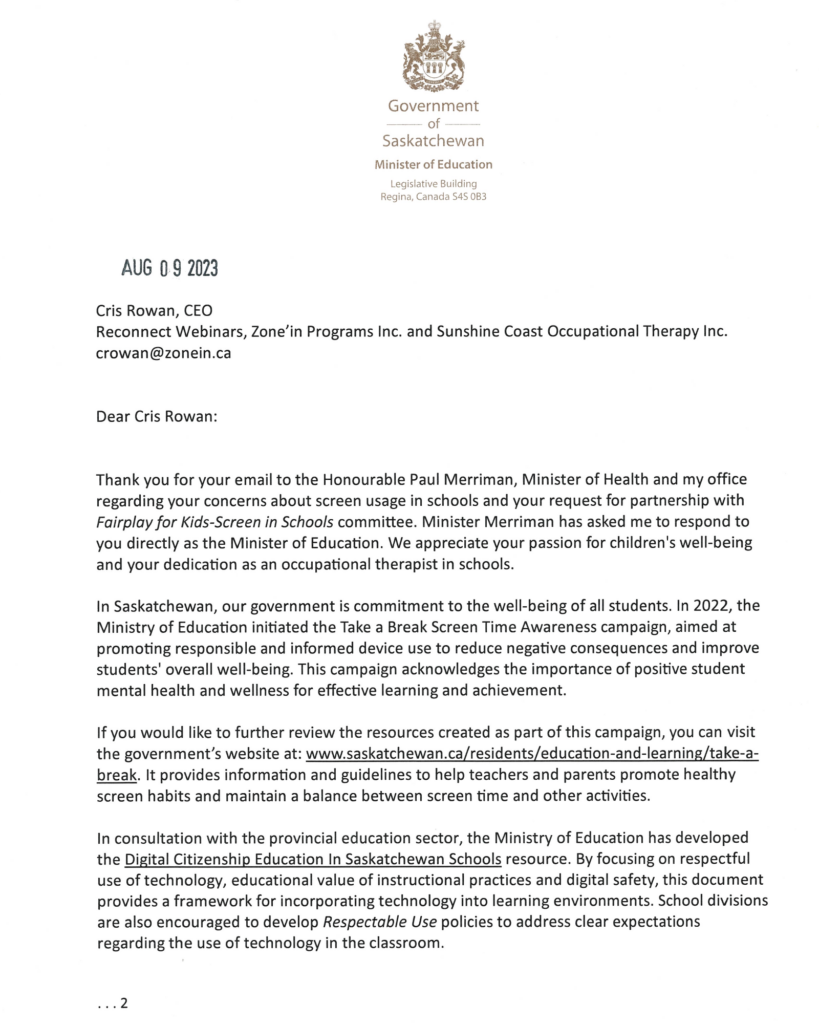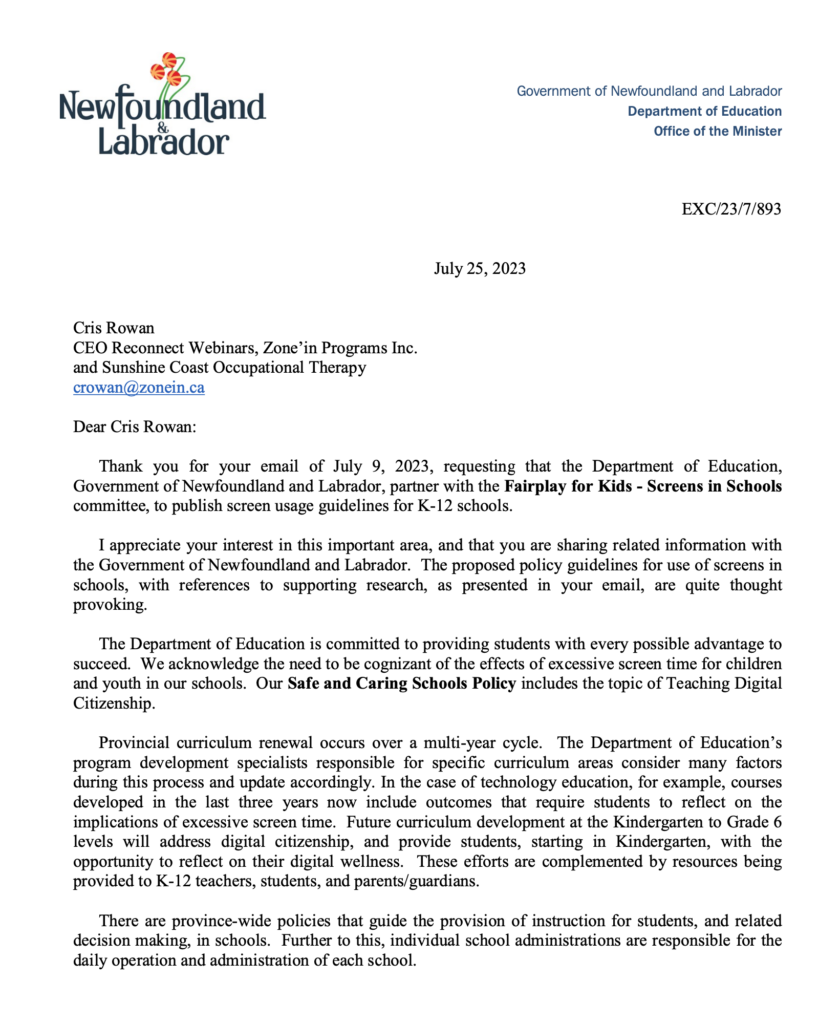Below policy guidelines were forwarded to all
Canadian Health and Education Ministers on July 10, ‘23
For responses from Ministers of Education,
please see below.
For responses from Ministers of Education, please
see below.
News Updates
- July ’23 - Queensland government confirms blanket mobile phone ban in state schools, bringing it into line with other states | ABC News Australia
- Aug. ’23 - ‘Put learners first’: Unesco calls for global ban on smartphones in schools | Unesco | The Guardian
- Sept. ’23 - Sweden brings more books and handwriting practice back to its tech-heavy schools - ABC News (go.com)
- October 3rd, '23 - Mobile phones are to be banned in schools as education secretary Gillian Keegan is set to announce a dramatic intervention - to the relief of millions of parents and teachers | Daily Mail Online
I’m a pediatric occupational therapist (OT), biologist, international speaker, author of “Virtual Child” and am a member on Fairplay for Kids – Screens in Schools committee, who is passionate about changing the ways in which children use technology. Through my work as an OT in schools I’ve observed rapidly increasing use of screen-driven educational instruction, both pre/post-covid, despite prolific research showing detrimental effects of screens on child health and wellness. I’ve written to the American Academy of Pediatrics requesting screen usage guidelines for school, but they’ve told me it wasn’t their role nor their mandate. Due to pervasive infiltration of the technology industry into trusted institutions such as schools, I request that your government organization consider my request to partner together to implement the following Screens in Schools Policy Guidelines. Screen overuse is spiraling out of control resulting in significant harm to children and requires immediate ‘top down’ authoritarian intervention.
The onslaught of screens in homes and schools has resulted in significant negative outcomes for students, teachers and parents indicating the need to push the ‘pause tech’ button for reflection and planning. Students are sedentary and unfit resulting in 1 in 3 developmentally delayed and 1 in 3 obese or overweight. Screens are overstimulating to eyes, heart and brain causing visual impairment, cardiovascular damage, impaired brain development and attention deficit. Screen use is isolating students from what they yearn for the most, human love and connection resulting in soaring rates of anxiety, depression, and suicide. Screen overuse by parents and teachers is causing a ‘disconnect’ with children resulting in a host of emotional, mental, and social disorders. Children and youth have never been sicker than they are now and the time to act has passed. At this point in time, ALL screen use should be considered detrimental to child development, behavior and learning. A U.S. 2021 study reported that setting and monitoring screen time limits, discussing impacts of screen use, taking frequent breaks, incorporating movement throughout the day, encouraging adults to practice healthy screen use and tapering screen use are effective measures to reduce harmful effects of screentime on children and youth. A Canadian 2022 research article proposes evidence-based recommendations for school-related sedentary behaviours for children and youth recommending replacing sedentary learning activities with non-screen-based learning activities to support student health and wellbeing. These 2 studies mandate schools form not only technology management policy to address declines in student health and wellbeing, but also enact media literacy programs.
Screens in Schools Policy Guidelines Draft
The following six research evidenced proposed policy guidelines for use of screens in schools for grades K-12 are proposed to promote student health and learning. Also included in these guidelines are movement and nature screen replacement interventions to enhance and ensure literacy achievement. A member of your government organization is requested to be appointed to provide input in the finalization and launch of these guidelines prior to Sept. 1, ’23. Please contact Cris Rowan crowan@reconnectwebinars.com for additional information and procedures.
- Provide preliminary student, teacher and parent research referenced education regarding detrimental impact of screens on child physical, social, emotional, mental and cognitive functions. Instruction should include the four critical factors for enhancing child development, behavior and learning with implementation examples for home, school and community.
Rowan, C. 2023. Ten Pillars of Successful Schools – Optimizing student health, safety and education. Retrieved from author’s Moving to Learn blog on July 9, ’23.
- Prohibit cell phones on school site by students, parents and teachers during school operating hours, as well as off school site during field or sports trips. Teachers can bring phones onto school site for use before/after school and use during lunch breaks but cannot bring their phones into classroom. Provision of a land line phone is suggested in all classrooms for all in-school communication with the teacher. Parents will be required to organize their schedules with their child(ren) prior to school day so as to not disrupt student learning. In the event of a school shooting, police have advised students to NOT use cell phones as this distracts their attention away from their teacher.
Nono Shen, The Canadian Press, May 6, ’23. Teachers say B.C. school teens showed improved grades and social skills after a ban on phones. Retrieved on July 9, ’23; author’s hometown.
- Restrict use of laptops and tablets to 2 devices per classroom; ensure adequate blocking of all entertainment and harmful media content including video games, pornography, social media, self-harm, cyberbullying and suicide. Schools will be required to stop use of all social media including Facebook, Instagram, TikTok, etc. as well as use of emails with students, and alternatively adopt safe non-digital methods of communication with students and parents.
Rowan, C. 2023. Video Games – Why are we knowingly letting children use an addictive substance? Retrieved from author’s Moving to Learn blog on July 9, ’23.
- Prohibit use of all screen technologies until grade 3 literacy achieved.
Wiley RW, Rapp B. 2021. The Effects of Handwriting Experience on Literacy Learning. Psychological Science 32(7): 1086-1103.
- Provide textbooks, paper, pencils, abacus boards and chalkboards to optimize foundational components for literacy attainment and improve student performance in printing, reading and math. Mandate provision of one set of encyclopedias per classroom; reopen and restock library.
Wolf, Maryanne. Reader Come Home – The reading brain in a digital world. 2018
- Implement use of nature and movement concepts with provision of in/outdoor schools (half day, half class is outside with noon switch), standing tables, wobble boards, body breaks, 2 recess and 1 lunch period outside, gym obstacle course, loose parts/fort materials and enhanced, age-appropriate playground structures.
Saunders TJ, Rollo S et.al. 2022. International school-related sedentary behaviour recommendations for children and youth. International Journal of Behavioral Nutrition and Physical Activity. 19:39.
Rowan, C. 2023. Healthy Education – Why screens in schools failed and what to do NOW to create solid foundations for literacy and learning. Retrieved from author’s Moving to Learn blog.
Thank you for your consideration of this most urgent request.
Cris Rowan, BScOT, BScBi, SIPT
CEO Reconnect Webinars, Zone’in Programs Inc. and Sunshine Coast Occupational Therapy Inc.
Member of Fairplay for Kids – Screens in Schools Committee
6840 Seaview Rd. Sechelt BC CANADA V7Z0E1
604-885-0986 O, 604-885-0389 F, 604-740-2264 C
Websites: reconnectwebinars.com, Blog: movingtolearn.ca Book: Virtual Child
Additional Article
Kathleen Barlow is a former teacher and parent to 6 children and currently serves on her local school board. Screen overuse very slowly had become a big problem in Kathleen’s family and now she is passionate about trying to help other families and the communities in which they live, in this same endeavor.
Responses from Ministers of Education

Dear Cris Rowan,
Thank you for your email about guidelines for screen use in schools.
The Ontario curriculum is designed to provide teachers with the flexibility to plan units of study, while taking into account their students’ interests and abilities and local resources and opportunities. Educators use their professional judgement to select resources and teaching strategies, including learning in the outdoors. When planning what students will learn, teachers identify the knowledge and skills described in the curriculum expectations, consider the contexts in which students will apply the learning, and determine students’ learning goals.
The appropriate use of technology is addressed on the ministry’s Curriculum and Resources website under the section describing Transferrable Skills. Digital literacy, which includes the appropriate use of technology, is one of the categories of transferable skills that students need in order to thrive in the modern world. As outlined, digital literacy involves the ability to solve problems using technology in a safe, legal, and ethically responsible manner. Educators must consider this information to guide teaching and learning, as well as creating the learning environment. The recently revised elementary Language curriculum (2023)now explores teaching and learning of digital literacy in detail in Strand A, with seven specific expectations supporting students’ use of digital and media tools.
Since November 2019, Policy/Program Memorandum 128: The provincial code of conduct and school board codes of conduct (PPM 128), includes a restriction on the use of cellphones and other personal mobile devices during instructional time, with the caveat that they can be used in specific situations:
- For educational purposes as directed by an educator
- Health and medical purposes
- To support special education needs.
Schools boards and schools must provide exceptions for students who need to use mobile devices to support, monitor, or regulate their health or medical conditions. Students with medical conditions do not require a signature from a physician or nurse practitioner to be eligible for this exception. They only need to provide a note from a parent or guardian. To learn more you may wish to visit Ontario’s webpage Cellphones and other personal mobile devices in schools.
As school boards are independent entities and are responsible for developing their own policies and procedures, including policies related to screen time, you may wish to contact school boards directly regarding your concerns. Contact information for each school board is on the Ministry of Education’s website at Find a school board or school.
Thank you again for writing and I hope this information is helpful.
Sincerely,
Perakaa Sethukavalan
Senior Manager
Curriculum, Assessment and Student Success Policy Branch
Ministry of Education

Dear Cris:
Thank you for your email regarding policy guidelines for screens in schools. I appreciate the opportunity to respond.
In Alberta, school authorities have the autonomy to make decisions about the programming and operations of their schools, as locally elected trustees are in the best position to evaluate and respond to the unique circumstances and priorities of the communities they serve. This includes decisions about the use of technology.
The Leadership Quality Standard for all leaders employed in a school authority requires that they are responsible for “creating an environment for the safe and ethical use of technology” and for “facilitating access to appropriate technology and digital learning environments”. Additionally, the Alberta Framework for School System Success as referenced in the Online Learning School and School Authority Leader Guide identifies three leadership strategies related to leveraging technology for learning:
1. School and school authority leaders focus on the instructional core and the ways in which changes in emerging technologies impact, change, threaten, enrich or enhance the instructional core.
2. School authority provides proactive leadership and support of the implementation of technology within a strong vision for learning.
3. Senior leaders employ IT governance approaches to align the system’s strategic IT direction with the school authority’s goals, to manage IT risks and to ensure that resources are used appropriately and responsibly.
Considering the localized authority for these decisions, you may want to engage directly with school authorities as your expertise and perspectives on screen usage in educational settings could be beneficial to them. A listing of Alberta’s school authorities and their contact information can be found here.
I appreciate you taking the time to write, and I thank you for your interest in helping to strengthen Alberta’s education system.
Best,
Demetrios Nicolaides ECA PhD
Minister of Education
Cc Honourable Adriana LaGrange, Minister of Health

Dear Cris Rowan:
Thank you for your email of July 9, 2023, to the Minister of Education and Early Childhood Development (EECD), regarding screen usage in schools and for extending an invitation to partner with the Fairplay for Kids – Screens in Schools committee. As Director of Policy and Planning, I have been asked to respond to your inquiry.
EECD values and understands the importance of teaching students to have a good understanding of how to use technology in ethical and responsible ways as school and personal devices, including cell phones, are useful to students for accessing resources to enhance the learning experience. The Provincial School Network Access and Use Policy addresses this by outlining how technology should and should not be used in school. For more information, please refer to the Provincial School Network Access and Use Policy.
Teachers are responsible, through the P-12 curriculum outcomes, to teach students how to use their technology in ethical and responsible ways. Teachers also instruct students on acceptable use of cell phones in classrooms and have the right to respond to inappropriate use when it disrupts teaching and learning.
EECD greatly appreciates your invitation to partner with the committee on such important work and looks forward to receiving the final version of the guidelines this fall.
Thank you for reaching out with feedback on your experiences observing the use of screens in schools and for sharing the work of the committee.
Sincerely,
Karen McNeil Noel
Director, Policy and Planning






